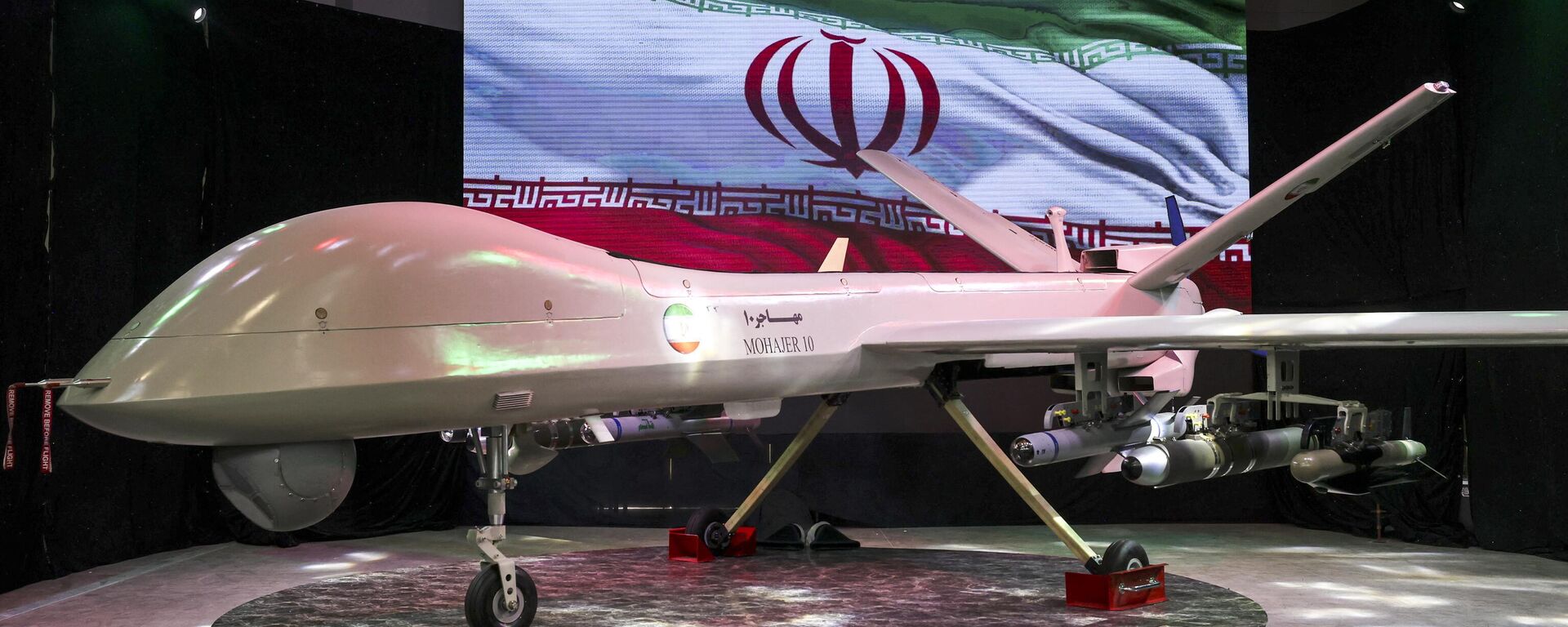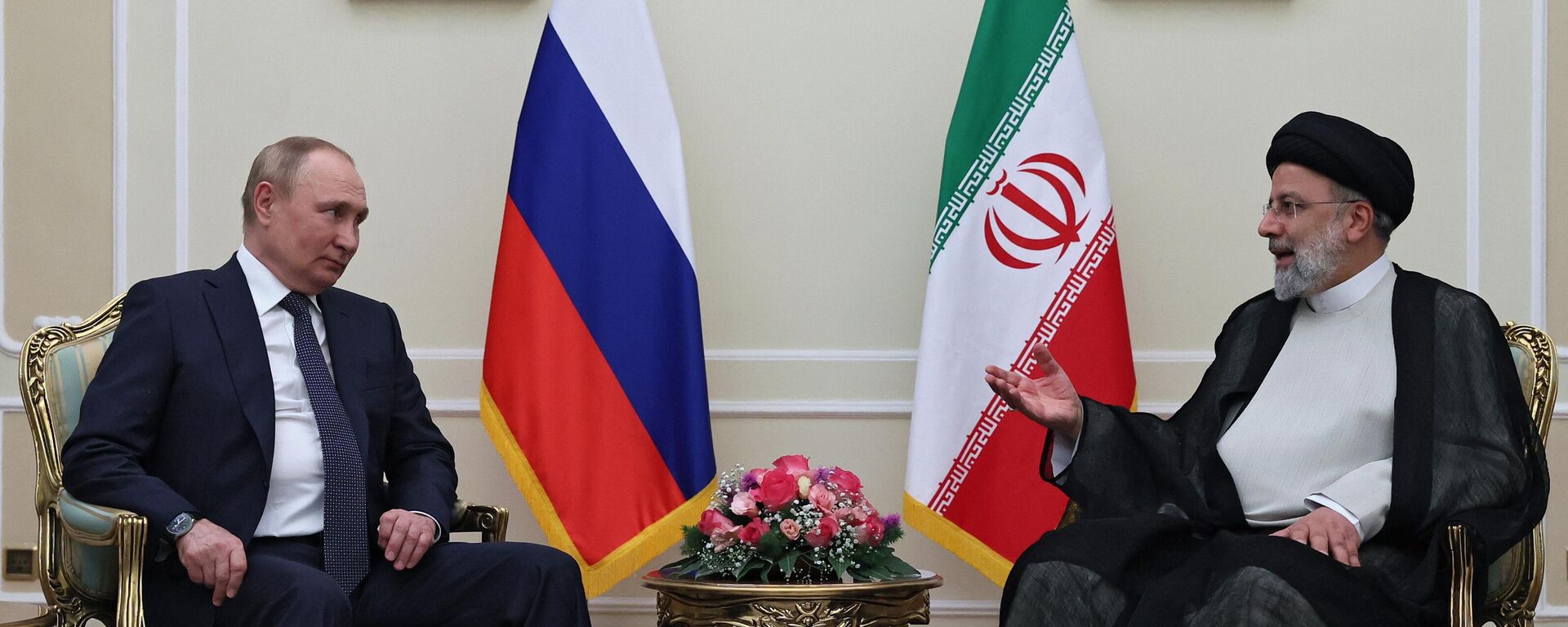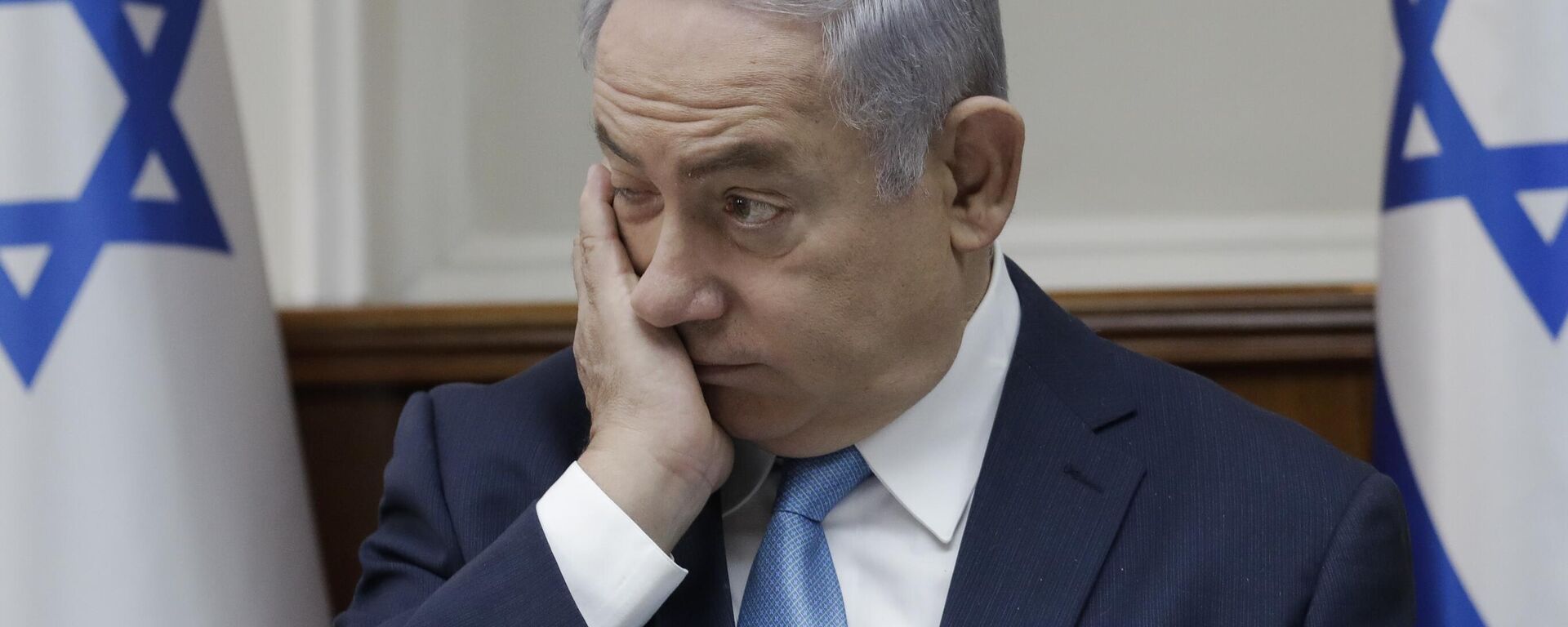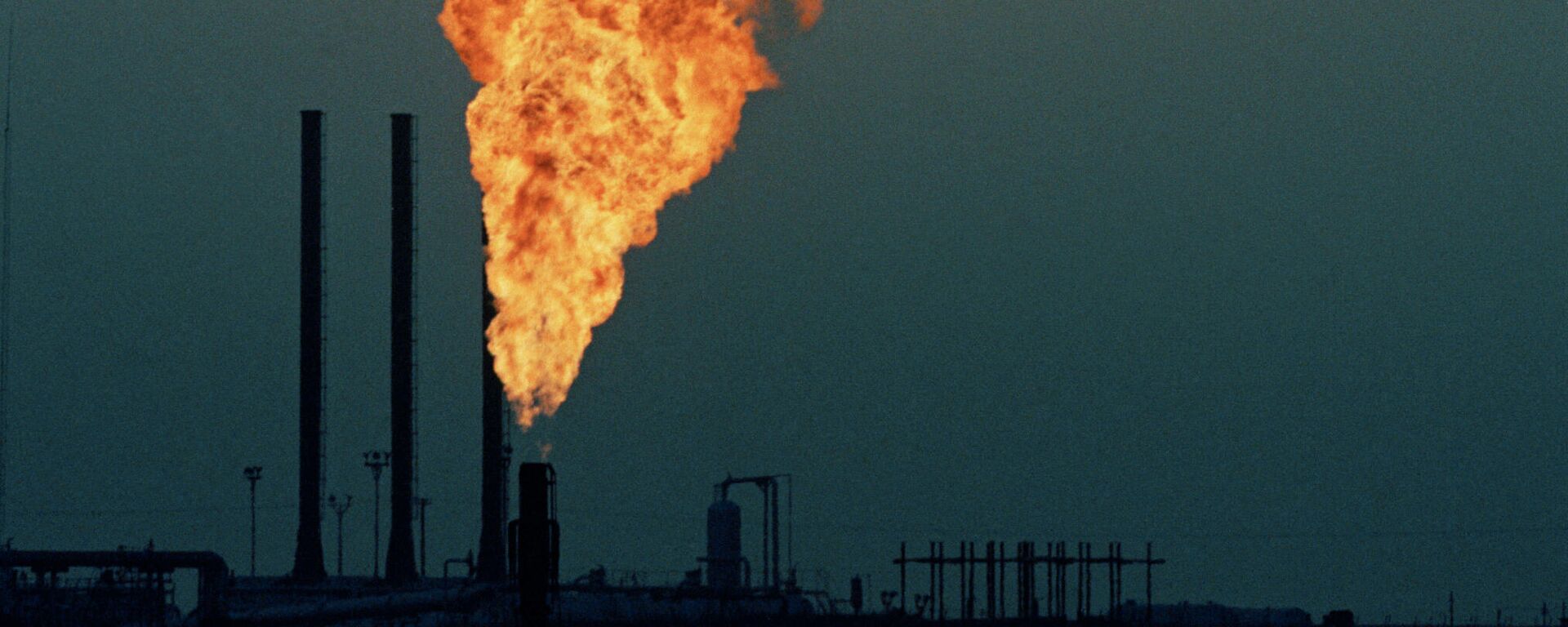https://sputnikglobe.com/20240417/israel-in-catch-22-damned-if-it-retaliates-against-iran-and-damned-if-it-doesnt--1117983997.html
Israel in Catch-22: Damned If It Retaliates Against Iran and Damned If It Doesn't
Israel in Catch-22: Damned If It Retaliates Against Iran and Damned If It Doesn't
Sputnik International
Prime Minister Benjamin Netanyahu signaled on April 17 that Israel would decide on its own how to respond to Iran's retaliatory attack. For its part, Washington is urging Tel Aviv to show restraint.
2024-04-17T19:37+0000
2024-04-17T19:37+0000
2024-04-18T04:20+0000
israel
us
grigory lukyanov
middle east
benjamin netanyahu
ebrahim raisi
russian academy of sciences (ras)
tel aviv
iran
nuclear
https://cdn1.img.sputnikglobe.com/img/07e7/07/0f/1111896335_0:0:1655:932_1920x0_80_0_0_26f65cc27c09fd866eac85b59819175d.jpg
Israel's war cabinet met on April 16 to discuss a potential response to Iran's Saturday strike avenging the death of two Iranian generals, but did not come to a conclusion. On Wednesday, Netanyahu told a cabinet meeting that while Israel's allies have provided all kinds of suggestions and advice to Tel Aviv, the Jewish state will pick options on its own."I want to make it clear: We will make our own decisions, and the state of Israel will do everything necessary to defend itself," Netanyahu vowed.'US Factor' in the Way of Israel's RetaliationEarlier, US President Joe Biden and his European counterparts urged Israel to show restraint and avoid a large-scale regional conflict, promising to slap Iran with new sanctions over the latest missile strike."Israel's ability to continue the war depends on the United States, because the US provides it with ammunition and weapons. Therefore, of course, the role of the United States is great. (…) The Israeli leadership will use its lobbying power to the fullest to persuade the American establishment to support a response that is sufficiently visible, meaningful, effective, and so on," the expert explained.However, Israeli military and political leaders do not seem to view sanctions as a proportional response to Iran's strike, which damaged Tel Aviv's image and arguably exposed some serious gaps in the Jewish state's air defenses, according to the expert.He explained that one of the most crucial elements of Israel's security concept throughout the years has been the principle that any attack on Israeli soil would not go unpunished. Furthermore, the military retaliation would be significantly more devastating than the initial adversary's strike.However, Iran's recent shift in its security doctrine has to some extent upset Israel's applecart, according to Lukyanov. The expert referred to the idea of "active containment" articulated recently by Tehran. This means that any Israeli strike against Iranian citizens on the territory of Iran, Syria, Lebanon or any other state in the world will be met with strikes on Israeli territories.Iran’s President Ebrahim Raisi stated during the nation's annual army parade in Tehran on Wednesday that even the "slightest" attack by Tel Aviv on Iran will be "dealt with fiercely and severely". Raisi called the Saturday Iranian counterstrike "limited and punitive," hinting that a stronger military response by Iran would have wiped Israel off the map of the Middle East.How Could Israel Respond?Given all of the above, Israel needs to pick a balanced solution which at the same time could serve as a PR coup for Tel Aviv.Lukyanov outlined four potential scenarios:"The military response apparently considered by Israel could include hybrid warfare methods. These are cyber weapons tools. In fact, cyber-attacks have already been carried out on control technologies, control systems existing in Iran, with the aim of disrupting water and energy supply systems. That is, a blow to infrastructure, as well as to intelligence, management and all other functions of the state," he noted.The second option, says Lukyanov, involves carrying out a targeted strike on Iran's military infrastructure, such as military bases and facilities that produce missiles and unmanned aerial vehicles. He also suggested the possibility of targeting infrastructure related to Iran's nuclear and missile programs, like production complexes, laboratories, institutes, and development centers."There have been repeated accusations suggesting that the actions carried out by the banned international terrorist organization ISIS* in Iran may have been inspired by operations organized in collaboration with Israeli or American intelligence services," said Lukyanov, suggesting that sabotage attacks by non-state actors may also be expected.Another possible course of action that Israel could potentially take is the liquidation of high-profile Iranian leaders, the expert suggests. Lukyanov pointed out that Israel's Ministry of National Security is currently headed by a hardliner and anti-Iran hawk, Itamar Ben-Gvir.Most recently, Ben-Gvir wrote on X (formerly Twitter) that "in order to create deterrence in the Middle East" Israel must show that it is prepared to "go nuts" and called for a "crushing attack" on Iran.Israel HesitatesHowever, given the threat of a dramatic escalation between Israel and Iran and the fact that the Jewish state's economy has contracted around 20% after the outbreak of the Gaza war (which is not over yet), Tel Aviv is still hesitating with the response.*ISIS (ISIL/Islamic State) is a terrorist group banned in Russia and many other countries.
https://sputnikglobe.com/20240417/us-to-impose-new-sanctions-on-iran-targeting-its-missile-and-drone-program---sullivan-1117969859.html
https://sputnikglobe.com/20240416/putin-discusses-middle-east-escalation-with-iranian-president-raisi-in-phone-call---kremlin-1117958477.html
https://sputnikglobe.com/20240417/the-game-has-changed-irans-retaliatory-attack-revealed-israels-military-weaknesses--1117969405.html
https://sputnikglobe.com/20240416/pain-at-the-pump-why-military-action-or-sanctions-against-iran-may-backfire-on-us--allies-1117960384.html
israel
tel aviv
iran
Sputnik International
feedback@sputniknews.com
+74956456601
MIA „Rossiya Segodnya“
2024
News
en_EN
Sputnik International
feedback@sputniknews.com
+74956456601
MIA „Rossiya Segodnya“
Sputnik International
feedback@sputniknews.com
+74956456601
MIA „Rossiya Segodnya“
israel response to iran's strike, iran's relatiation strike, us sanctions on iran, benjamin netanyahu, how could israel respond to iran's strike, israel's war cabinet, israel's gaza war, israel's economic slowdown, joe biden, us urges israel to show restraint after iran's strike, iran inflicted reputational damage to israel
israel response to iran's strike, iran's relatiation strike, us sanctions on iran, benjamin netanyahu, how could israel respond to iran's strike, israel's war cabinet, israel's gaza war, israel's economic slowdown, joe biden, us urges israel to show restraint after iran's strike, iran inflicted reputational damage to israel
Israel in Catch-22: Damned If It Retaliates Against Iran and Damned If It Doesn't
19:37 GMT 17.04.2024 (Updated: 04:20 GMT 18.04.2024) Prime Minister Benjamin Netanyahu signaled on April 17 that Israel would decide on its own how to respond to Iran's retaliatory attack. For its part, Washington is urging Tel Aviv to show restraint.
Israel's war cabinet met on April 16 to discuss a
potential response to Iran's Saturday strike avenging the death of two Iranian generals, but did not come to a conclusion. On Wednesday, Netanyahu told a cabinet meeting that while Israel's allies have provided all kinds of suggestions and advice to Tel Aviv, the Jewish state will pick options on its own.
"I want to make it clear: We will make our own decisions, and the state of Israel will do everything necessary to defend itself," Netanyahu vowed.
'US Factor' in the Way of Israel's Retaliation
Earlier, US President Joe Biden and his European counterparts urged Israel to show restraint and avoid a large-scale regional conflict, promising
to slap Iran with new sanctions over the latest missile strike.
"The US factor is very significant," Grigory Lukyanov, a researcher at the Center for Arabic and Islamic Studies at the Institute of Oriental Studies of the Russian Academy of Sciences (RAS), told Sputnik. "The United States is not interested in escalating the conflict. If the incumbent US administration supports Israel's [military response - Sputnik] ahead of the elections, it will certainly literally lose the support of American Muslim voters," he noted.
"Israel's ability to continue the war depends on the United States, because the US provides it with ammunition and weapons. Therefore, of course, the role of the United States is great. (…) The Israeli leadership will use its lobbying power to the fullest to persuade the American establishment to support a response that is sufficiently visible, meaningful, effective, and so on," the expert explained.
However, Israeli military and political leaders do not seem to view sanctions as a proportional response to Iran's strike, which damaged Tel Aviv's image and arguably exposed
some serious gaps in the Jewish state's air defenses, according to the expert.
He explained that one of the most crucial elements of Israel's security concept throughout the years has been the principle that any attack on Israeli soil would not go unpunished. Furthermore, the military retaliation would be significantly more devastating than the initial adversary's strike.
However, Iran's recent shift in its security doctrine has to some extent upset Israel's applecart, according to Lukyanov. The expert referred to the idea of "active containment" articulated recently by Tehran. This means that any Israeli strike against Iranian citizens on the territory of Iran, Syria, Lebanon or any other state in the world will be met with strikes on Israeli territories.
Iran’s President Ebrahim Raisi stated during the nation's annual army parade in Tehran on Wednesday that even the "slightest" attack by Tel Aviv on Iran will be "dealt with fiercely and severely". Raisi called the Saturday Iranian counterstrike "limited and punitive," hinting that a stronger military response by Iran would have wiped Israel off the map of the Middle East.
How Could Israel Respond?
"The Israeli leadership would prefer to deliver a limited, but nevertheless significant, symbolic strike on Iranian soil in response," Lukyanov said. "Today, such an attack is associated with the risk of escalating the conflict, which requires resources. And Israel simply does not have these resources after six months of the exhausting war in the Gaza Strip. Without constant regular supplies from the United States and its allies, a military campaign of this scale, with real effect, with real results, is simply impossible. The resources of the US are also not limitless. They are also focused on other fronts in Europe and East Asia."
Given all of the above, Israel needs to pick a balanced solution which at the same time could serve as a PR coup for Tel Aviv.
Lukyanov outlined four potential scenarios:
"The military response apparently considered by Israel could include hybrid warfare methods. These are cyber weapons tools. In fact, cyber-attacks have already been carried out on control technologies, control systems existing in Iran, with the aim of disrupting water and energy supply systems. That is, a blow to infrastructure, as well as to intelligence, management and all other functions of the state," he noted.
The second option, says Lukyanov, involves carrying out a targeted strike on Iran's military infrastructure, such as military bases and facilities that produce missiles and unmanned aerial vehicles. He also suggested the possibility of targeting infrastructure related to Iran's nuclear and missile programs, like production complexes, laboratories, institutes, and development centers.
"There have been repeated accusations suggesting that the actions carried out by the banned international terrorist organization ISIS* in Iran may have been inspired by operations organized in collaboration with Israeli or American intelligence services," said Lukyanov, suggesting that sabotage attacks by non-state actors may also be expected.
Another possible course of action that Israel could potentially take is the liquidation of high-profile Iranian leaders, the expert suggests. Lukyanov pointed out that Israel's Ministry of National Security is currently headed by a hardliner and anti-Iran hawk, Itamar Ben-Gvir.
Most recently, Ben-Gvir wrote on X (formerly Twitter) that "in order to create deterrence in the Middle East" Israel must show that it is prepared to "go nuts" and called for a "crushing attack" on Iran.
However, given the threat of a dramatic escalation between Israel and Iran and the fact that the Jewish state's economy has contracted around 20% after the outbreak of the Gaza war (which is not over yet), Tel Aviv is still hesitating with the response.
"This forces the Israeli leadership to scale down its political ambitions and delay a retaliatory strike, thus risking Israel’s strategic security in the long term," Lukyanov argues. "In fact, Israel does not have an alternative for the maxim that 'any attack will be met with retribution'. The longer Israel delays its response, the more it loses. And most importantly, the more the current cabinet, the war cabinet, the Netanyahu cabinet loses," he concluded.
*ISIS (ISIL/Islamic State) is a terrorist group banned in Russia and many other countries.






